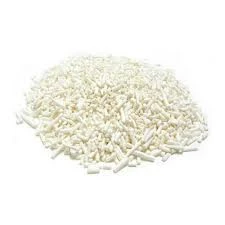
soy lecithin emulsifier
The Role of Soy Lecithin Emulsifier in Food Production
In recent years, the food industry has witnessed a significant transformation, driven by consumer demand for healthier options and cleaner labels. Among the many ingredients that have gained attention, soy lecithin has emerged as a popular emulsifier due to its versatile properties and numerous benefits. This article delves into the role of soy lecithin emulsifier in food production, exploring its functionalities, health benefits, and applications.
What is Soy Lecithin?
Soy lecithin is a natural substance derived from soybeans. It is a phospholipid, a type of fat molecule that contains both hydrophilic (water-attracting) and hydrophobic (water-repelling) components. This unique structure makes soy lecithin an effective emulsifier, allowing it to blend oil and water-based ingredients that would otherwise separate. The substance is often produced as a byproduct during the processing of soybean oil.
Functions of Soy Lecithin as an Emulsifier
1. Stabilization One of the primary functions of soy lecithin is its ability to stabilize emulsions, such as mayonnaise, dressings, and sauces. By reducing the surface tension between oil and water phases, it helps create a smooth, homogenous mixture that maintains its consistency over time.
2. Improved Texture In baked goods, soy lecithin contributes to improved texture and mouthfeel. It can enhance dough mixing, resulting in a fine crumb structure and increased moisture retention. This results in softer bread, cakes, and pastries.
3. Shelf Life Extension The incorporation of soy lecithin can extend the shelf life of products. Its antioxidant properties help protect sensitive ingredients from oxidation, preventing rancidity and maintaining flavor quality.
4. Fat Reduction As a natural emulsifier, soy lecithin can allow for a reduction in the overall fat content of a product. This is particularly beneficial for low-fat or reduced-calorie versions of snacks and spreads, where maintaining texture and flavor is crucial.
Health Benefits of Soy Lecithin
soy lecithin emulsifier

Beyond its functional roles, soy lecithin offers several health benefits
1. Choline Source Soy lecithin is a rich source of choline, an essential nutrient that plays a key role in liver function, brain development, and muscle movement. Choline is particularly important during pregnancy, contributing to fetal brain development.
2. Heart Health Some studies suggest that the consumption of soy lecithin may be linked to improved cardiovascular health. It can help lower LDL (bad) cholesterol levels, potentially reducing the risk of heart disease.
3. Support for Cognitive Function Choline, found in soy lecithin, has been associated with better memory and cognitive performance. This may be particularly beneficial for older adults or those with memory concerns.
Applications in the Food Industry
Soy lecithin's emulsifying properties make it a valuable ingredient in a myriad of food products, including
- Baked Goods Cakes, bread, and cookies benefit from improved texture and moisture retention. - Dressings and Sauces Keeps oil and vinegar mixed, providing a stable and smooth consistency. - Confectionery Used in chocolates and candies, soy lecithin helps achieve the desired fluidity and shelf stability. - Dairy Products In creamers and yogurt, it assists in emulsification and texture enhancement.
Conclusion
As the food industry continues to evolve, soy lecithin stands out as a multifunctional emulsifier that not only enhances the quality and stability of various products but also contributes important health benefits. With its increasing acceptance among consumers seeking cleaner and healthier ingredients, soy lecithin is likely to maintain its position as a key player in food production. Whether enjoyed in a slice of bread or a dollop of salad dressing, soy lecithin enriches our culinary experience while supporting our health in numerous ways.
-
Understanding Synthetic Rubber OptionsNewsApr.27,2025
-
Trichloroisocyanuric Acid: Essential for Clean and Safe WaterNewsApr.27,2025
-
Sodium Dichloroisocyanurate: Key to Safe Water TreatmentNewsApr.27,2025
-
Sodium Acid Pyrophosphate: Essential in Modern Food ProcessingNewsApr.27,2025
-
Essential Water Treatment ChemicalsNewsApr.27,2025
-
Denatured Alcohol and Its Industrial UsesNewsApr.27,2025
-
The Versatile Uses of Sodium BicarbonateNewsApr.24,2025
Hebei Tenger Chemical Technology Co., Ltd. focuses on the chemical industry and is committed to the export service of chemical raw materials.
-

view more DiethanolisopropanolamineIn the ever-growing field of chemical solutions, diethanolisopropanolamine (DEIPA) stands out as a versatile and important compound. Due to its unique chemical structure and properties, DEIPA is of interest to various industries including construction, personal care, and agriculture. -

view more TriisopropanolamineTriisopropanolamine (TIPA) alkanol amine substance, is a kind of alcohol amine compound with amino and alcohol hydroxyl, and because of its molecules contains both amino and hydroxyl. -

view more Tetramethyl Thiuram DisulfideTetramethyl thiuram disulfide, also known as TMTD, is a white to light-yellow powder with a distinct sulfur-like odor. It is soluble in organic solvents such as benzene, acetone, and ethyl acetate, making it highly versatile for use in different formulations. TMTD is known for its excellent vulcanization acceleration properties, which makes it a key ingredient in the production of rubber products. Additionally, it acts as an effective fungicide and bactericide, making it valuable in agricultural applications. Its high purity and stability ensure consistent performance, making it a preferred choice for manufacturers across various industries.











